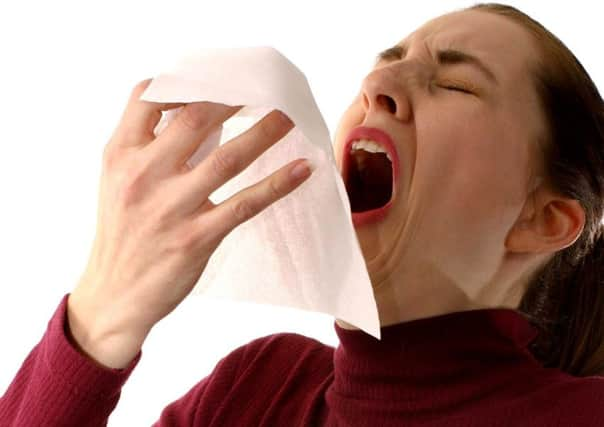Top tips for dealing with winter illness


It’s a condition that inflames and narrows the airways in the lungs making it difficult to breathe. Symptoms include being out of breath when exercising or moving around, a persistent cough with phlegm that never goes away, wheezing and frequent chest infections.
These symptoms are often worse in the wintertime when the weather becomes colder. That’s why, before the busy winter period, doctors at Doncaster Royal Infirmary are urging everyone who has COPD to take extra special care to prevent their symptoms becoming particularly bad and ending up in hospital.
Advertisement
Hide AdAdvertisement
Hide AdMrs Elizabeth Billany, 93, from Doncaster, was diagnosed with the condition about five years ago and with the support of her local GP Practice nurses she is managing her condition at home.


Betty said: “I was getting out of breath and went to see my doctor. I was given a tube to blow into to test my lungs. I remember it was hard to do because I don’t have much strength, but I managed it.
“The nurse told me all the things I should and shouldn’t do to keep it under control, like not going outside when it is very cold. Although I did go out when it was windy recently and regretted it because I wasn’t well afterwards so I’ll know better next time. I take my medication every day and walk as often as I can. My family and friends help too and because they know I have COPD and stay away if they have a cold which I’m pleased about.”
Dr Moe Kyi, Consultant in Respiratory Medicine at Doncaster and Bassetlaw Hospitals, said: “Doncaster has a high number of people with COPD and we tend to see more and more people coming into hospital with breathing problems caused by chest infections. Chest infections cause the COPD to flare up. With severe flare-ups, people often don’t get back their usual level of fitness even after treatment and their overall health and wellbeing gets worse. It is very important that patients know more how to manage their own condition so that they are able to cope better with their symptoms and avoid flare-ups.
Advertisement
Hide AdAdvertisement
Hide Ad“I am very pleased that Betty is taking good care of herself. This is something I would encourage everyone to do to avoid being admitted to hospital.”
There are some simple steps to help reduce the severity of your COPD symptoms and chances of a flare-up:
Keep active
Take your medication as prescribed, even if you feel better
Keep in touch with your healthcare team and discuss any concerns with them
Keep well by having your yearly flu jab and an anti-pneumonia vaccination
Check the weather forecast
Advertisement
Hide AdAdvertisement
Hide AdAvoid dusty places, fumes, smoke, and strong smelling products
Maintain a healthy weight
If you have been given standby medications, use them when appropriate
Stop smoking if you haven’t done yet
Tips for dealing with winter illnesses
Some health problems, such as asthma, sore throat and cold sores, are triggered by cold weather. Here’s how to help your body deal with cold weather ailments.
Colds
You can prevent colds by washing your hands regularly. This destroys the bugs you may have picked up from touching surfaces used by other people.
Advertisement
Hide AdAdvertisement
Hide AdTIP: use disposable tissues instead of cloth handkerchiefs to avoid constantly reinfecting your own hands
Sore throats
Sore throats are common in winter and are almost always caused by viral infections.
TIP: Gargle with warm, salty water. It won’t healt the infection, but its anti-inflammatory properties will have a soothing effect. Dissolve one teaspoon of salt in a glass of part-cooled boiled water.
Asthma
Cold air is a major trigger of asthma symptoms, such as wheezing and shortness of breath.
Advertisement
Hide AdAdvertisement
Hide AdTIP: Stay indoors on very cold, windy days. If you do go out, wear a scarf over your mouth and nose.
Norovirus
Also known as winter vomiting bug. It’s unpleasant but normally over within a couple of days.
TIP: Drink plenty of fluids to prevent dehydration
Painful joints
Many people with arthritis say their joints become more painful in winter.
TIP: Some people get a little depressed during winter and this can make everything feel worse. Daily exercise can boost your mental and physical state, and swimming is ideal as it’s easy on the joints.
Heart attacks
Advertisement
Hide AdAdvertisement
Hide AdAre more common in winter. This may be because cold snaps increase blood pressure and puts more strain on the heart.
TIP: Stay warm at home. Keep the main rooms you use at 21 degrees C. Wrap up warm when you go out and wear a hat, scarf and gloves.
Cold hands
Fingers can go white, then blue, then red and throb and tingle. It’s a sign of poor circulation in the small blood vessels in the hands and feet.
TIP: Don’t smoke or drink caffeine as they can both worsen the symptoms. Always wrap up well in the cold.
Dry skin
Advertisement
Hide AdAdvertisement
Hide AdIs a common condition and often worse during the winter, when environmental humidity is low.
TIP: have warm, rather than hot, showers. Water that is too hot make skin feel more dry and itchy.
Flu
Is a major killer of the elderly and people with long term health problems, such as diabetes and kidney disease.
TIP: Find out if you’re in a high risk group by asking your GP and have a vaccination if you are.Chronic Obstructive Pulmonary Disease (COPD) is one of the most common reasons for people being admitted to hospital during the winter.